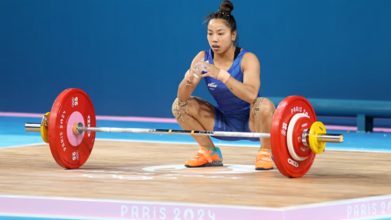
Credits: Olympics.com
Mirabai Chanu Opens Up About Her Period Struggles: How Athletes Handle Menstruation During Competition
Paris Olympics 2024 trended on social media platforms for being the first edition of the Olympics to promote gender parity, meaning an equal number of female and male athletes were selected.
This edition also broke a lot of taboos, including mental health and reproductive health.
Indian weightlifter Mirabai Chanu who finished fourth in the women’s 49 Kg event at the Paris Olympics talked about how menstruation affected her performance. She said that she was “feeling weak” as it was her third day of the period.
Dr Nishi Singh, gynaecologist and obstetrics and Head of fertility at Prime IVF who has been practising for over 20 years says, “Menstruation can have a significant impact on female athletes, presenting unique challenges that can affect their performance. During menstruation, women may experience symptoms such as cramps, fatigue, bloating, and mood swings, all of which can impact their athletic performance. These symptoms can reduce energy levels, impair focus, and cause discomfort, making it more difficult to train and compete at peak levels.”
Breaking the Period Silence
Swimmer Fu Yuanhua from People’s Republic of China who lost a medal at the Rio Olympics in 2016 said, “Actually, my period started yesterday evening. That’s why I feel very weak and tired, but this is not an excuse. At the end of the day, I simply did not swim very well.” This earned Fu a lot of praise on social media for breaking the taboo around period and how it affects athletes and their performance.A French handball Olympic champion Estelle Nze Minko in 2020 said that she had been practicing high-level sport for over a decade, however, it was only a year before when she was asked about menstruation. This shows how this topic is often ignored even in the sports fraternity.
However, just before winning a double Olympic crown in judo in Tokyo 2020, France’s Clarisse Agbegnenou became the ambassador for French menstrual underwear, educating women on menstruation and women’s sports.
Gradually, women athletes are opening up on menstruation and how it affects their performance. New Zealand’s golf player Lydia Ko said, “the younger me would say it is embarrassing, but now I don’t think it is that embarrassing to say it anymore because I am not the only one, right?”
Systematic Changes
French figure skater Mae-Berenice Meite featured many other women athletes on her YouTube channel who talked about their experiences with menstruation and sports. With women athletes speaking up on this topic, which was considered taboo before, changes in the game rules were seen.In the 2023 FIFA Women’s World Cup, several women's football squads switched to playing with dark-coloured shorts. All thanks to Great Britain women’s footballer Beth Mead who said, “white is not practical when it is the time of the month.”
In 2023, even in Wimbledon, women tennis players were allowed to wear dark-coloured undershorts for the first time in the tournament's history. This was a historical and landmark decision, as it happened 146 years after the game’s launch.
How Does Period Affect Performance?
Six-time Olympic medalist and former American gymnast Aly Raisman said, “when you are really nervous, you have butterflies in your stomach, and you have your period, it is just not a good combination.” Israeli marathon runner Lonah Chemtai Salpeter also acknowledged that period cramps affect one’s performance. She said that her cramps were so bad that she had to take a break during her race at the Tokyo Olympics.A woman undergoes four different phases in her menstrual cycle, namely menstruation, follicular, ovulation and luteal. The shift from one phase to another may cause weakness, cramps, and loss of sleep.
Inflammation increases during ovulation when the ovary releases an egg.
Research by UCL and the University of Bath studied football players of the Women’s Super League and found that athletes were six times more likely to get a muscle injury during the pre-menstrual phase. While they were six times more prone to an injury during the mid-luteal phase.
Also Read: Explained: What Does the New Union Budget Have for Our Health Care?
Another 2021 research that studied female footballers stated that fluctuation in female sex hormones may lead to injuries in their muscles, tendons and ligaments. The study found that 88 per cent of the chances of getting a muscle or tendon injury increase during the follicular phase.
“Hormonal changes during the menstrual cycle can lead to fluctuations in energy and endurance,” says Dr Singh.
How to Manage It?
Dr Singh says that athletes must focus on self-care during their menstrual cycle.Staying hydrated, eating a balanced diet with iron-rich foods to combat potential anaemia, and ensuring sufficient rest and recovery are some of the common ways to manage it.
Some athletes also use period-tracking apps, while others choose birth control pills to delay their menstruation. However, they come with their own side effects.
“Coaches play a crucial role in supporting female athletes during their menstrual cycle by being attentive to their unique needs. By adjusting training routines and providing personalised care, coaches can ensure that athletes maintain their performance levels and overall well-being, even during challenging phases of their cycle,” says Dr Singh.

Credit: Canva
Ozempic Can Help People With Diabetes Walk Better Despite Poor Blood Flow To Legs
Semaglutide, a well-known drug for diabetes and weight loss, commonly referred to as Ozempic, has been found to help patients with peripheral artery disease (PAD) walk longer distances. PAD is a circulatory condition where narrowed arteries reduce blood flow to the limbs due to plaque buildup. This condition is particularly common among individuals with diabetes.
A study published in The Lancet demonstrated that administering 1 mg of semaglutide to adults with type 2 diabetes and symptomatic PAD led to a 13% increase in their walking distance compared to those given a placebo. The drug was also associated with an improvement in ankle-brachial indices, a key test that compares blood pressure in the ankle to that in the arm, assessing blood flow in the lower limbs. The results of the STRIDE trial were presented at the American College of Cardiology Annual Meeting on March 29. The research was funded by Novo Nordisk, the manufacturer of Ozempic.
Beyond Blood Sugar Levels
The significance of this study lies in its demonstration of semaglutide's multifaceted protective effects beyond just improving blood sugar levels and aiding weight loss. Previous findings have already established its role in reducing the risk of cardiovascular events, benefiting kidney health, and even helping lower certain addictive behaviors.
Understanding Peripheral Artery Disease (PAD)PAD occurs when arteries narrow, restricting blood flow to the arms and legs. It is one of the most serious complications of diabetes and a leading cause of disability and amputation. More than 230 million people worldwide are affected by PAD, and there are currently no medical treatments available that can prevent or slow down its complications in diabetics.
Experts emphasize that PAD is a persistent and highly debilitating disease for which no current therapies exist. Patients suffering from PAD often experience severe limitations in their ability to function and walk without pain. As the condition progresses, some individuals may require interventions such as revascularization surgery, which aims to restore blood supply to the legs. In extreme cases, limb amputation may become necessary.
Semaglutide As A Potential Solution
Medical professionals point out that functional impairment in individuals with PAD is often overlooked in its early stages despite the severe disability it causes. The findings of the STRIDE trial are particularly promising as they indicate that semaglutide’s benefits on maximum walking distance were noticeable at 26 weeks and continued to improve up to 52 weeks without reaching a plateau. This suggests that semaglutide could be a viable long-term therapy option for PAD patients.
Experts further highlight that amputation is one of the most feared complications of diabetes and is significantly more common in diabetic individuals than in those without the condition. The findings of this study offer a ray of hope in addressing this pressing issue.
Following the trial’s promising results, Novo Nordisk has submitted a label extension application for Ozempic to the US Food and Drug Administration (FDA). If approved, this could mark a major breakthrough in the treatment of PAD, potentially offering a new medical option for millions affected by the disease.

Credits: Canva
1 in 15 Australians Live With Diabetes, Finds Study
As per the Australian Bureau of Statistics (ABS) National Health Measures Survey, 1 in 15 Australian adults is living with diabetes. The ABS also included the details on the number of Australians who showed signs of kidney disease, vitamin D deficiencies and other potential chronic illnesses.
The survey also noted a total 6.6% of Australians over the age of 18 have diabetes. There is also an increase of 1.5% when compared to a decade ago.
What Is Diabetes?
Diabetes is a long-term condition that happens when there is too much sugar in your bloodstream. This is because your body is unable to process it correctly. When someone is diabetes-free, the pancreas produce a hormone called insulin that helps move sugar into the cells of the body. However, with someone with diabetes, the pancreas either does not make enough insulin or the body does not use it well. This leads to sugar build up in the blood.
Increasing Prevalence of Diabetes
Diabetes has become a significant health challenge in Australia, with the number of diagnosed individuals rising to 1.3 million between 2000 and 2021. Data from the Australian Institute of Health and Welfare (AIHW) shows that men are more likely to have diabetes than women. Additionally, adults living in socioeconomically disadvantaged areas are at a higher risk of developing the condition. These figures highlight the growing burden of diabetes on individuals and healthcare systems nationwide.
Apart from diagnosed cases, an estimated 500,000 Australians may be living with undiagnosed type 2 diabetes. The National Health Measures Survey also found that 2.7% of adults are at high risk of developing diabetes. The prevalence of undiagnosed cases suggests a need for increased awareness, screening, and early intervention to prevent complications.
What Could Be The Risk Factors?
Several health risk factors contribute to diabetes, including a high body mass index (BMI), large waist circumference, smoking, and high blood pressure. Individuals with diabetes are more likely to exhibit multiple risk factors compared to those without the condition. However, data also shows that 88.9% of people with diabetes are non-smokers, and 70.5% maintain normal blood pressure levels. These findings align with the management goals set by the Royal Australian College of General Practitioners.
How Can Diabetes Be Managed?
Lifestyle and dietary changes can significantly reduce the risk of developing type 2 diabetes. Research indicates that up to 58% of cases can be delayed or prevented through healthier choices. However, approximately 42% of cases are linked to genetic factors, making prevention challenging for some individuals. Reducing the stigma around diabetes is essential to encourage at-risk individuals to seek medical advice and support without fear of judgment.
Cholesterol and Vitamin D Deficiency Trends
The AIHW health survey also examined cholesterol levels and vitamin D deficiencies among Australians. Around 30.2% of adults have high cholesterol, with women more likely to be affected than men. Additionally, 17.8% of adults have cholesterol levels close to abnormal.
High-density lipoprotein (HDL), often referred to as "good cholesterol," plays a crucial role in transporting cholesterol to the liver for breakdown. However, 14.9% of Australians have an abnormally low HDL level, increasing their risk of heart disease and stroke.
Seasonal Variations in Vitamin D Levels
Vitamin D deficiency is another widespread health concern, affecting 20.6% of adults. Seasonal variations impact deficiency rates, with 26.1% of adults experiencing low vitamin D levels in winter, compared to 15.5% in summer. Vitamin D is essential for calcium absorption, bone health, and muscle function, and severe deficiencies can lead to brittle bones and other health issues.

Image Credit: Canva
Why Your Chronic Pain Might Be The Real Reason For Your Worsening Anxiety And Mood Swings
Pain is the body’s way of signaling that something is wrong. In most cases, pain fades once the underlying issue heals. However, for millions of people, pain becomes a constant companion, lasting for months or even years. This condition, known as chronic pain, not only affects physical health but also has a profound impact on emotional well-being.
Current studies emphasize the strong link between chronic pain and mental illness such as anxiety and depression. Individuals suffering from long-term pain tend to be stuck in a vicious cycle of fear, stress, and emotional distress. But how does chronic pain actually lead to deteriorating mental health, and how can the cycle be stopped?
For over 45 million Americans, chronic pain is a way of life. Although physical pain is the most visible symptom, its impact reaches far beyond the physical body. Chronic pain is frequently accompanied by psychological distress, as many victims experience anxiety and depression caused by their illness.
As per Dr. Ravi Kesari, a general medicine specialist, "Chronic pain and mental illness tend to exacerbate each other. Patients have disturbed sleep patterns, increased mental tension, and depression-like symptoms. This forms a vicious circle in which pain causes emotional distress, which further increases the perception of pain."
This cycle is especially seen in conditions like:
Fibromyalgia – A syndrome of widespread pain, fatigue, and cognitive difficulty.
Irritable Bowel Syndrome (IBS) – A bowel condition frequently associated with stress and tension.
Lower Back Pain – Prolonged pain in the lower back, often accompanied by decreased mobility and depression.
Migraine and Nerve Pain – Prolonged headaches and nerve pain that interfere with daily functioning.
Research indicates that two-thirds of IBS sufferers experience anxiety symptoms, and 65% of patients with depression exhibit chronic pain symptoms. This commonality indicates that mental illness not only heightens sensitivity to pain but also complicates recovery.
How Stress of Chronic Pain Can Rewires Your Brain?
When a person hurts, the body releases stress chemicals such as cortisol and adrenaline to assist in the regulation of pain. Such hormones are helpful during short-term occurrences, but once pain persists over time, continued exposure to stress hormones alters brain chemistry.
"Chronic pain leads to chronic stress, and that changes the neurochemicals in the brain that control mood, thought processes, and behavior," explains Dr. Kesari. "That's why people with chronic pain tend to be irritable, angry, or drained of emotions."
Chronic exposure to stress hormones can cause:
Heightened anxiety and fear reactions, making people excessively careful about everyday activities.
Depression, as serotonin and dopamine levels decrease—two neurotransmitters that produce happiness and motivation.
Cognitive impairment, including problems concentrating, remembering, or deciding.
Pain, Anxiety, and the Fear of Movement
Another very frequent mental impact of chronic pain is kinesiophobia, or fear of movement. Individuals with chronic pain tend to avoid movement for fear of making their pain worse. This avoidance behavior can cause stiffness in the muscles, loss of mobility, and increased pain over time.
For example, a person with chronic back pain might try to avoid exercising, which would further weaken muscles and worsen their condition. This pattern of avoidance and worsened pain begets a spiraling sense of helplessness that further fuels anxiety and mood shifts.
"Anxiety is an understandable reaction to chronic pain," says Dr. Kesari. "People become concerned about what pain will mean for their lives, so tasks that are minor—such as shopping for groceries or socializing—become overwhelming."
Daily Struggles and Self-Esteem Loss
Chronic pain does not only impact mood; it is able to significantly modify the way an individual perceives himself. Most of those who have chronic pain struggle with simple activities such as exiting bed, dressing up, or personal hygiene. Failing to do so by oneself may cause the individual to feel inadequate, frustrated, and socially withdrawn.
As Dr. Kesari describes, "Patients tend to feel ill at ease in social situations because they view their condition as a restriction. This adds to low self-esteem and exacerbates mental illness such as depression."
Considering the complex connection between chronic pain and mental well-being, both physical and emotional welfare must be treated.
Dr. Kesari stresses, "Healthcare providers need to take a whole-body approach to treating chronic pain. That involves coupling conventional pain management with mental health care to break the cycle between pain and emotional distress."
Some strategies that have been found to be effective are:
Cognitive Behavioral Therapy (CBT) – A type of psychotherapy that enables people to deal with negative thought processes and respond to pain.
Physical Therapy & Movement-Based Practices – Gentle exercise, like tai chi or yoga, decreases pain and alleviates fear of movement.
Medication Management – Painkillers can be beneficial, but only as part of a combination of holistic therapies to prevent dependency.
Stress-Reduction Techniques – Techniques such as meditation, deep breathing, and mindfulness assist in balancing stress hormones.
Social Support & Therapy Groups – Sharing experiences with others who live with chronic pain has been shown to combat the sense of isolation and offer emotional support.
Chronic pain is not merely a physical condition—it has a powerful impact on mental health, causing anxiety, depression, and extreme lifestyle constraints. But knowledge of the interlinkage of pain and emotional health can encourage proactive measures toward improved general well-being.
Dr Ravi Kesari is MBBS, MD- General Medicine at Apollo Spectra Hospital, Bangalore in India
© 2024 Bennett, Coleman & Company Limited

